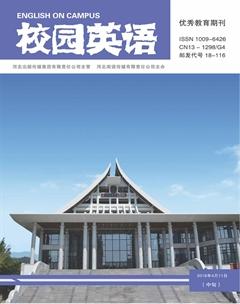Ambition and Anxiety
Zhang Yiwen
Among the stories in Geoffrey Chaucers The Canterbury Tales, The Wife of Bath is the most impressive one. In this short story, Chaucer shows us a vivid image—the wife of Bath. Belonging to both the Middle Ages and the Renaissance, this short story has some special features.
From Dark Ages to the relatively free Renaissance, peoples thinking was liberated a lot and more and more people turned their attention to individual freedom and sought for temporal joys. Nevertheless, inflexible thought wasnt that easy to change, so we can see the contradictory and some antithesis in The Wife of Bath.
From the description of her appearance and dress in the prologue, we can see the wife of Bath is wealthy and belongs to up-class. “Her stockings were of the finest scarlet red. Tightly fastened, and her shoes were soft and new. Bold was her face, and fair, and red of hue”. This is the first impression Chaucer gave to us. She wears gorgeous but gaudy dress, while such exaggerated expression lets us have a feeling of ridiculous affection and cannot help simmering.
The wife has been married five times and she is desperate for her sixth husband. Even in that not open-minded society, she asserts eloquently that “I have the right to control mans body”. She condemns the churchs asceticism and advocates free marriages. Whether in the prologue or in the main body, the wife always emphasizes one thing, that is the predominance in the marriage must be the woman, instead of the man. She repeats over and over again, even makes readers feel boring. However, just like Floyd says that “ mans verbal behavior is the outward manifestation of his inward subconscious”, the wife of Baths unconscious repetition reflexes her goal is to control men, to be the master of all her husbands. This is her ambition, while such ambition leads to great anxiety.
She longs for controlling her husband, for dominating them. In her narration of her five husbands, we can see her confidence and pride in winning their favor. To the first four husbands, she narrates them in an impatient way, and shows a kind of scorn. In her mind, she deserves to receive their love and they ought to be obedient to her, even cater to her. However, when speaking of her fifth husband, she mentions that “he arouses my yearning” and “I love him wholeheartedly—love him, instead of his wealth”. Nevertheless, from her narration, we can know the fifth husband is the only one who dares to get mad at her—even slapped her so hard to make her lose half of her hearing. Such striking contrast between the first four and the fifth makes me think why her attitude shifts so quickly and suddenly? Just because she loves him most? Or because he is the last one to leave her, so she still has a feeling for him? Actually, its just like a song sings “not always in anxiety, always loved nothing to fear”, this is the consequence of her ambition.
Such ambition and anxiety can also be seen from the wifes story. The warrior who committed a deadly crime was about to be killed, but the queen saved him and ordered him to find an answer for her—“what is womans most aspiration”. Having passed lots of places and asked variety of people, none of their answers can satisfy him. At last, an incredibly hideous old woman offered him a perfect answer—“womans most aspiration is to control her own husband or lover, to be their master”, while she only told him on one condition. After the warrior fulfilled the queens request, the old woman asked him to meet his commitment. Beyond his expectations, the old woman asked him to take her to be his wife. Cannot refuse her request, the warrior was quite upset but compelled to marry her. Without any smile or words from the bridegroom, the wedding was deep and grave. However, the story made a turning point—after the warrior kissed the old woman, the old woman became a sweetest little rosebud.
This imaginative story reflexes the same purport as the wife of Bath emphasizes—“I have the right to control man”. Actually, this young lady is the embodiment of the wife of Bath. She has been old and lost half of her hearing— just like that old woman in that story. At the same time, she is eager to use her beauty and wit to subjugate and get her sixth husband, to have a fit and proper marriage—just like that young lady. However, her ambition cannot deserve such nicety, she cannot be young again and she cannot regain her hearing. Her anxiety is clearly shown in the story which she tells. Without magic, she will always be that ugly old woman.
During social transformation, the wife of Bath represents most people, especially women in that society. She is open-minded, but she is also controlled by the narrow-minded society. She is eager to control men, to be their master, while at the same time, she also suffers from her anxiety.

